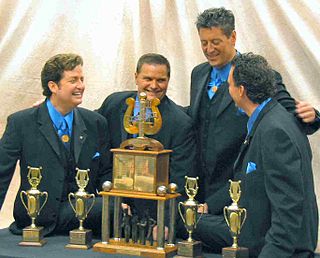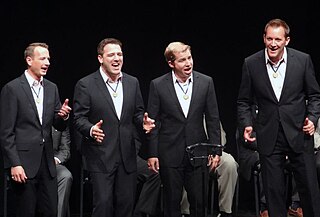Related Research Articles

A barbershop quartet is a group of four singers who sing music in the barbershop style, characterized by four-part harmony without instrumental accompaniment, or a cappella. The four voices are: the lead, the vocal part which typically carries the melody; a bass, the part which provides the bass line to the melody; a tenor, the part which harmonizes above the lead; and a baritone, the part that frequently completes the chord. The baritone normally sings just below the lead singer, sometimes just above as the harmony requires. Barbershop music is typified by close harmony— the upper three voices generally remain within one octave of each other.

The Barbershop Harmony Society, legally and historically named the Society for the Preservation and Encouragement of Barber Shop Quartet Singing in America, Inc. (SPEBSQSA), is the first of several organizations to promote and preserve barbershop music as an art form. Founded by Owen C. Cash and Rupert I. Hall in Tulsa, Oklahoma in 1938, the organization quickly grew, promoting barbershop harmony among men of all ages. As of 2014, just under 23,000 men in the United States and Canada were members of this organization whose focus is on a cappella music. The international headquarters was in Kenosha, Wisconsin for fifty years before moving to Nashville, Tennessee in 2007. In June 2018, the society announced it would allow women to join as full members.

Barbershop vocal harmony, as codified during the barbershop revival era (1930s–present), is a style of a cappella close harmony, or unaccompanied vocal music, characterized by consonant four-part chords for every melody note in a primarily homorhythmic texture. Each of the four parts has its own role: generally, the lead sings the melody, the tenor harmonizes above the melody, the bass sings the lowest harmonizing notes, and the baritone completes the chord, usually below the lead. The melody is not usually sung by the tenor or baritone, except for an infrequent note or two to avoid awkward voice leading, in tags or codas, or when some appropriate embellishment can be created. One characteristic feature of barbershop harmony is the use of what is known as "snakes" and "swipes". This is when a chord is altered by a change in one or more non-melodic voices. Occasional passages may be sung by fewer than four voice parts.
In music theory, a dominant seventh chord, or major minor seventh chord, is a seventh chord, composed of a root, major third, perfect fifth, and minor seventh. Thus it is a major triad together with a minor seventh, denoted by the letter name of the chord root and a superscript "7". In most cases, dominant seventh chord are built on the fifth degree of the major scale. An example is the dominant seventh chord built on G, written as G7, having pitches G–B–D–F:
The Buffalo Bills were a barbershop quartet formed in Buffalo, New York in 1947. The quartet won the 1950 International Championship and is best known for appearing in the 1957 Broadway production The Music Man and its 1962 film version. The quartet was in existence for 20 years, until their last performance in New York City in 1967.
Gotcha! is an American barbershop quartet formed in 1996 by four members of the Masters of Harmony chorus.
Gas House Gang was a barbershop quartet that won the 1993 SPEBSQSA International Quartet Competition. They started singing as a group in 1987 in St. Louis Missouri. After winning the 1988 Central States District Competition in their first attempt, they began a steady climb up the International Competition ladder which culminated in Calgary, Alberta, Canada, where they were awarded the 1993 International Quartet Championship.
Realtime is a barbershop quartet that won the Barbershop Harmony Society's International Quartet Championship in 2005. They finished seventh-place the previous year. Lead singer John Newell is the first Australian-born international champion. Baritone Mark Metzger and bass Tom Metzger are the first champions who are both Canadian-born and Canadian citizens. Tenor Tim Broersma is from Lynden, Washington. In 2008, Doug Broersma became the lead singer when Newell retired for family reasons. The quartet was succeeded by Via Voice when Tim Broersma retired in 2011, also for family reasons.

Barbershop arranging is the art of creating arrangements of barbershop music. The Barbershop Harmony Society (BHS) and Sweet Adelines International (SAI) have prescribed rules that dictate what is an acceptable arrangement, particularly with regard to singing in competition. This makes barbershop arranging a specialist form of arranging, rarely tackled by those outside barbershop; likewise, barbershop arrangers tend to be known only for their barbershop arrangements rather than for their work in any other musical form.
Vocal Spectrum is a barbershop quartet from St. Charles, Missouri. In 2004, Vocal Spectrum won the Barbershop Harmony Society's International Collegiate Quartet Contest, and on July 8, 2006, they became International Champions, winning the society's International Quartet Contest. A distinctive feature of the quartet is tenor Tim Waurick's ability to sustain notes for upwards of 30 seconds, and the tenor's and lead's incredibly high vocal range, featured in many of the group's recordings and live shows.
Dealer's Choice is a barbershop quartet that won the 1973 SPEBSQSA international competition in Portland, Oregon. They were the first group since 1952 to win the competition their first year entering, and no quartet has won the competition on their first year entering since 1973.
Ringmasters is a Swedish barbershop quartet affiliated with the Society of Nordic Barbershop Singers (SNOBS). The quartet received first place gold medals at the Nordic Barbershop Quartet Contest in Stockholm, and won the Barbershop Harmony Society International Collegiate Championship in July 2008 in Nashville, Tennessee. On July 8, 2012, at the Society's International Convention in Portland, Oregon, they became the first quartet from outside North America to win the prestigious gold medal as International Quartet Champions. The quartet sings non-traditional barbershop harmonies with a contemporary touch. They still tour and perform all over the world.

Max Q is the barbershop quartet that won the gold medal Barbershop Harmony Society International Barbershop Quartet Contest at Denver's Pepsi Center July 7, 2007. The quartet's run for the title is featured in the 2009 feature documentary American Harmony.

The harmonic seventh chord is a major triad plus the harmonic seventh interval. This interval is somewhat narrower and is "sweeter in quality" than an "ordinary" minor seventh, which has a just intonation ratio of 9:5, or an equal-temperament ratio of 1000 cents.

OC Times is a male barbershop quartet affiliated with the Barbershop Harmony Society. They earned second place silver medals at the International Barbershop Quartet Contest at Denver's Pepsi Center on July 7, 2007, and won the International Quartet Championship on July 5, 2008, in Nashville, Tennessee. The quartet combines traditional barbershop harmonies with contemporary music styles. The music of OC Times is inspired by artists like Michael Buble, Sinatra, and Elvis.

Vocal harmony is a style of vocal music in which a consonant note or notes are simultaneously sung as a main melody in a predominantly homophonic texture. Vocal harmonies are used in many subgenres of European art music, including Classical choral music and opera and in the popular styles from many Western cultures ranging from folk songs and musical theater pieces to rock ballads. In the simplest style of vocal harmony, the main vocal melody is supported by a single backup vocal line, either at a pitch which is above or below the main vocal line, often in thirds or sixths which fit in with the chord progression used in the song. In more complex vocal harmony arrangements, different backup singers may sing two or even three other notes at the same time as each of the main melody notes, mostly with a consonant, pleasing-sounding thirds, sixths, and fifths.
Storm Front is the barbershop quartet that won the International Quartet Championship for 2010 at the Barbershop Harmony Society's annual international convention in Philadelphia, Pennsylvania.
Musical Island Boys is the barbershop quartet that won the International Quartet Championship for 2014 at the Barbershop Harmony Society's annual international convention, in Las Vegas, Nevada. From Wellington, New Zealand, the quartet began in 2002 at Tawa College, and competed in its first international barbershop contest in 2004. They won the international collegiate contest in 2006 at Indianapolis, and won second-place silver medals in 2011, 2012, and 2013 international contests. Other awards include the New Zealand and Pan-Pacific Open Gold Medals at the 4th Pan Pacific Barbershop Convention in 2004, and second place in the International Open Barbershop Championships in 2011.
Main Street is a barbershop quartet that started singing as a group on March 20, 2011.
Forefront is the barbershop quartet that won the International Quartet Championship for 2016 at the Barbershop Harmony Society's annual international convention, in Nashville, Tennessee. The quartet had placed second in the 2014 and 2015 international contests, after competing at the international level annually since 2010. Forefront formed in August 2009.
References
- ↑ "All Past Champions". Barbershop Harmony Society. Retrieved July 1, 2024.